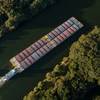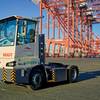Greeks at Frontline of Migrant Crisis Angry at EU Critics
ABOARD THE AGIOS EFSTRATIOS, Aegean Sea, Feb 11: Greek Captain Argyris Frangoulis lifts his binoculars and with eyes fixed on the Aegean Sea horizon, steers his patrol boat out near the Turkish border to a dinghy full of stranded refugees.
He zeroes in on the target and gasps - "My God!" - another grey rubber motor boat packed with about four times as many people as it can hold, many of them young children and babies.
"Everybody safe, OK?" he yells at the passengers, mainly Syrians and Afghans, approaching the coast guard vessel bewildered and in near-silence. "Stay calm and do not panic!"
About 50 people are pulled aboard one by one, smiling but too exhausted to speak. By the time they stagger wearily to the boat's rear, a dinghy is spotted in the distance. Then another, and another, crammed almost entirely with women and children.
By midday, the Agios Efstratios, a gunboat with 29-member crew who work in shifts, had plucked more than 600 people from sea and ferried them to the port of Lesbos, the island on the frontline of Europe's migration crisis.
From Greece's islands, the refugees and migrants travel to the mainland and then to the northern border with non-European Union member Macedonia. Most of them are trying to reach Germany.
The influx has led some in the EU to accuse Greece of failing to make use of available EU funds and personnel to ensure people arriving in the Schengen zone of open border travel are documented. Some EU members have suggested Greece should be suspended from Schengen if it does not improve.
But the criticism and threats have been met with anger in Greece. Prime Minister Alexis Tsipras on Wednesday said the EU was "confused and bewildered" by the migrant crisis and said the bloc should take responsibility like Greece has done, despite being crash-strapped.
Most Greeks, including the coast guard, the army, the police were "setting an example of humanity to the world," Tsipras said.
For those at the frontline, foreign criticism is even more painful.
"We're giving 150 percent," said Lieutenant Commander Antonis Sofiadelis, head of coast guard operations on Lesbos.
Once a dinghy enters Greek territorial waters, the coast guard is obliged to rescue it and transport its passengers to the port.
"The sea is not like land. You're dealing with a boat with 60 people in constant danger. It could sink, they could go overboard," he said.
RELIEF AFTER EVERY RESCUE
More than a million people, many fleeing war-ravaged countries and poverty in the Middle East and Africa, reached Europe in the past year, most of them arriving in Greece.
For the crews plying a 250-km-long coastline between Lesbos and Turkey, the numbers attempting the crossing are simply too big to handle. It is but a fraction of a coastline thousands of kilometers long between Greece and Turkish shores.
"The flow is unreal," Sofiadelis said.
Lesbos has long been a stopover for refugees. Locals recall when people fleeing the Iraqi-Kurdish civil war in the mid-1990s swam across from Turkey.
Yet those numbers do not compare to what has become Europe's biggest migration crisis since World War Two and which has continued unabated despite the winter making the Aegean Sea even more treacherous.
After days of gale force winds and freezing temperatures, more than 2,400 people arrived on Greece's outlying islands on Monday, nearly double the daily average for February, according to United Nations data.
Sofiadelis, the Lesbos commander, said controls should be stepped up on the Turkish side, while Europe should provide assistance with more boats, more staff and better monitoring systems such as radars and night-vision cameras.
Greek boats, assisted by EU border control agency Frontex, already scan the waters night and day.
By late morning on Monday, Captain Frangoulis and his crew - including a seafaring dog picked up at a port years ago - have been at sea for more than 24 hours.
Each time his crew spot a boat that could be carrying migrants "our stomach is tied up in knots," Frangoulis said. "There's this fear that everything must go well, everyone boards safely, no child falls in the sea, no one's injured."
Though fewer than 10 nautical miles separate Lesbos from Turkish shores, hundreds of people have drowned trying to make it across.
Patrol boats, as well as local fishermen, have often fished out corpses from the many shipwrecks of the past months, the bodies blackened and bruised from days at sea.
After every rescue operation, a sense of relief fills the crews. Once the Agios Efstratios docked at the Lesbos harbour on Monday, Frangoulis' beaming crew helped passengers disembark, holding up crying babies in their arms.
"There's no room for sentimentalism. We execute commands," Frangoulis said of the rescue operations.
"Beyond commands, we're human. We'll lose heart, we'll cry, we'll feel sad if something doesn't go well. There isn't a person who won't be moved by this," he said.













